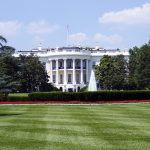President Trump recently unleashed another bold move to rein in the bloated federal bureaucracy. His latest executive order, signed Wednesday, targets an array of federal agencies, including the United States Institute of Peace and other advisory committees, furthering his crusade to shrink the government. This initiative not only aims to cut through inefficiency but also brings a refreshing dash of common sense to a system often mired in waste.
The order builds on Trump’s previously issued directive that takes a closer look at the spending habits of independent agencies. By shining a spotlight on this financially dense jungle, the executive branch is set to reclaim control from a sprawling network of bureaucrats who often seem more interested in creating problems than solving them. The underlying goal is clear: reduce government waste, tackle inflation, and restore innovation and freedom to the American people. It’s about time someone tackled the evident excesses of the federal government instead of letting them grow unchecked.
Donald J Trump has written an executive order effectively ending @FHFA authority and DOJ can no longer defend
Unconstitutional
1)"May act in the best interest of @POTUS" 4617b2jii
2) "No court may take action on @POTUS" 4617fConservatorship is overhttps://t.co/6MYytdXAMf
— Ano (@Ano3020100) February 20, 2025
In a move that would make any budget-conscious American proud, the order mandates the elimination of “non-statutory components and functions” from entities like the Presidio Trust and the United States African Development Foundation. These so-called “necessary” foundations will see their bureaucratic fat trimmed to the bare minimum required by law. After all, why should taxpayers foot the bill for government programs that hardly seem to serve the people’s interests? It’s all about accountability, or at least what little remains in a system that often feels devoid of it.
To ensure compliance, the heads of these agencies will now be required to report back to Russell Vought, the director of the Office of Management and Budget, within 14 days. They must justify their existence and delineate why they matter in a day and age when fiscal responsibility is paramount. This kind of oversight is a refreshing change of pace from the usual “let’s-keep-funding-everything-just-because” mindset that has plagued Washington.
The order doesn’t stop there; it also calls for the termination of various other advisory committees within two weeks, some of which may even make one question their original justification for existing. From the Health Equity Advisory Committee to the Advisory Committee on Voluntary Foreign Aid, these groups will be evaluated for their relevance, with any deemed unnecessary on the chopping block within 30 days. Clearly, the era of unchecked advisory committees is coming to an end, and the frugality of the American taxpayer could finally begin to see some benefits.




